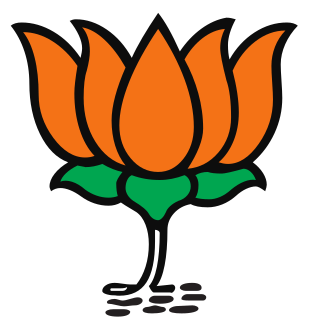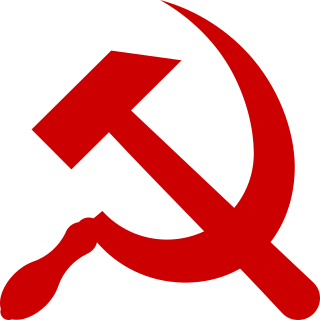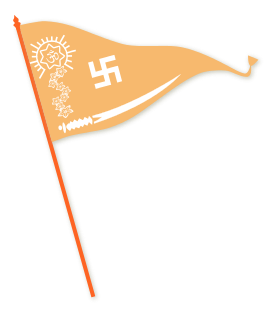The Politics of India works within the framework of the country's Constitution. India is a parliamentary Democratic Republic in which the President of India is the head of state and the Prime Minister of India is the head of government. It is based on the federal structure of government, although the word is not used in the Constitution itself. India follows the dual polity system, i.e. a(federal in nature) that consists of the central authority at the centre and states at the periphery. The Constitution defines the organisational powers and limitations of both central and state governments; it is well recognised, fluid and considered supreme, i.e., the laws of the nation must conform to it.

The Prime Minister of India, officially the Prime Minister of the Republic of India, is the leader of the executive branch of the Government of India. The prime minister is the chief adviser to the President of India and the head of the Union Council of Ministers. They can be a member of any of the two houses of the Parliament of India—the Lok Sabha and the Rajya Sabha ; but has to be a member of the political party or coalition, having a majority in the Lok Sabha.

Rajiv Ratna Gandhi was an Indian politician who served as the 6th prime minister of India from 1984 to 1989. He took office after the 1984 assassination of his mother, Prime Minister Indira Gandhi, to become the youngest Indian prime minister at the age of 40.

The Bharatiya Janata Party is one of two major political parties in India, along with the Indian National Congress. It is the current ruling political party of the Republic of India, having been so since 2014. The BJP is a right-wing party, and its policy has historically reflected Hindu nationalist positions. It has close ideological and organisational links to the much older Rashtriya Swayamsevak Sangh (RSS). As of 2019, it is the country's largest political party in terms of representation in the national parliament and state assemblies and is by far the world's largest party in terms of primary membership, with the second largest party, the Communist Party of China, having about half the registered members of the BJP.

The Indian National Congress is a political party in India with widespread roots. Founded in 1885, it was the first modern nationalist movement to emerge in the British Empire in Asia and Africa. From the late 19th century, and especially after 1920, under the leadership of Mahatma Gandhi, Congress became the principal leader of the Indian independence movement. Congress led India to independence from the United Kingdom, and powerfully influenced other anti-colonial nationalist movements in the British Empire.

The Communist Party of India (Marxist) is a communist political party in India. It is one of the national parties of India. The party emerged from a split from the Communist Party of India in 1964. The CPI(M) was formed in Calcutta from 31 October to 7 November 1964.

The Communist Party of India is the oldest communist political party in India, one of the eight national parties in the country. The CPI was formed on 26 December 1925 Politburo at Kanpur.

The All India Trinamool Congress is an Indian political party which is predominantly active in West Bengal. The party is led by current chief minister of West Bengal Mamata Banerjee. Following the 2019 general election, it is currently the fourth-largest party in the Lok Sabha with 22 seats. Since its inception the party has been at the forefront of the anti-communist movement in West Bengal.

The Hindu Mahasabha is a political party in India.
India has a parliamentary system as defined by its constitution, with power distributed between the central government and the states.
A Member of the Legislative Assembly (MLA) is a representative elected by the voters of an electoral district (constituency) to the legislature of State government in the Indian system of government. From each constituency, the people elect one representative who then becomes a member of the Legislative Assembly (MLA). Each state has between seven and nine MLAs for every Member of Parliament (MP) that it has in the Lok Sabha, the lower house of India's bicameral parliament. There are also members in three unicameral legislatures in Union Territories: the Delhi Legislative Assembly, Jammu and Kashmir Legislative Assembly Puducherry Legislative Assembly. Only a Member of the Legislative Assembly can work as a minister for more than 6 months. If a non Member of the Legislative Assembly becomes a Chief Minister or a minister, he must become an MLA within 6 months to continue in job. Only a Member of the Legislative Assembly can become Speaker of the Legislature.

The Constituent Assembly of India was elected to frame the Constitution of India. It was elected by the 'Provincial Assembly'. Following India's independence from British Government in 1947, its members served as the nation's first Parliament.

The Republican Party of India (Athawale) is a political party in India. The party is a splinter group of the Republican Party of India and has its roots in the Scheduled Castes Federation led by B. R. Ambedkar. The president of the party is Ramdas Athawale.

The Punjab Legislative Assembly or the Punjab Vidhan Sabha is the unicameral legislature of the state of Punjab in India. At present, it consists of 117 members, directly elected from 117 single-seat constituencies. The tenure of the Legislative Assembly is five years unless dissolved sooner. The current Speaker of the Assembly is Rana K. P. Singh. The meeting place of the Legislative Assembly since 6 March 1961 is the Vidhan Bhavan in Chandigarh.

Sarbananda Sonowal is an Indian politician from Assam who is the current Minister of Ports, Shipping and Waterways, Minister of AYUSH and a member of the Cabinet Committee on Political Affairs in the Government of India. Sonowal earlier served as the Assam state President of Bharatiya Janata Party (BJP) from 2012 to 2014 and again in 2015 to 2016. He is a former MLA in Assam Legislative Assembly, and also a former Chief Minister of Assam. Sonowal has also served as the Minister for Sports and Youth Affairs, Government of India, from 2014 to 2016. He was chosen to be the Chief Minister of Assam after the 2016 Assam Legislative Assembly election and he is the first Chief Minister of the state from Bharatiya Janata Party. During the cabinet reshuffle on 7th July 2021, he was inducted to the 2nd Modi Cabinet.

The Uttar Pradesh Legislative Assembly is the lower house of the bicameral legislature of Uttar Pradesh. There are 403 seats in the house filled by direct election using single member first-past-the-post voting system.

The Yuvajana Sramika Rythu Congress Party, is an Indian regional political party based in the state of Andhra Pradesh. It was founded by Y. S. Jaganmohan Reddy in 2011. Once members of the Indian National Congress, they split from that party in 2011. He was also elected as national party president by his members.

The 17th Lok Sabha was formed by the members elected in the 2019 Indian general election. Elections, all across India, were conducted in seven phases from 11 April 2019 to 19 May 2019 by the Election Commission of India. Counting started officially on the morning of 23 May 2019 and the results were declared on the same day.